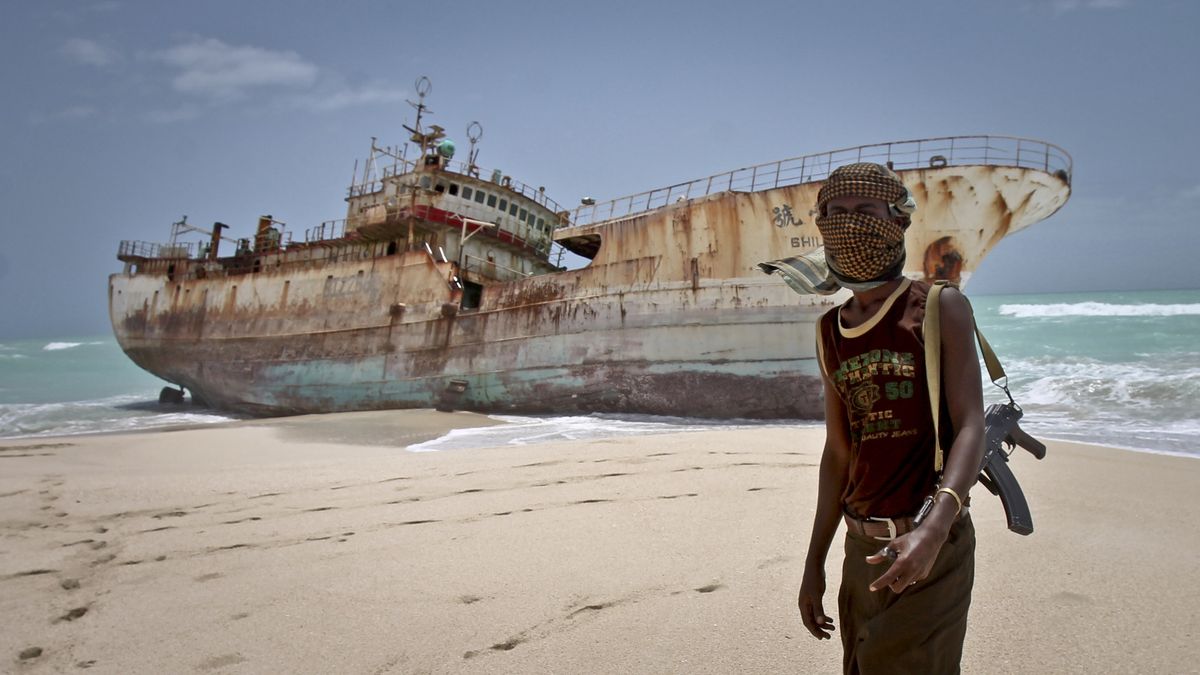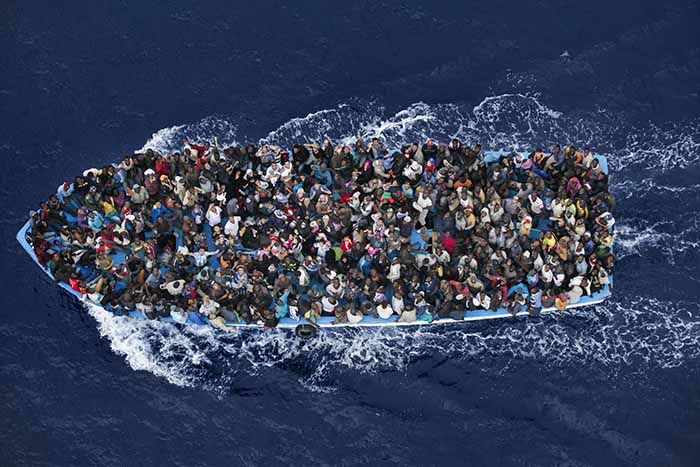Piracy in Somalia: Understanding the Causes, Impact, and Solutions
This blog explores the root causes, devastating impact, and potential solutions to piracy in Somalia. Learn about international and local efforts to combat this issue.

Piracy off the coast of Somalia has been a serious issue for more than ten years, with disastrous effects on the economy, population, and environment of the area. The problem has drawn attention internationally because piracy jeopardises the stability and security of the world by interrupting global trade. The causes, effects, and responses of piracy by domestic and international actors will all be discussed in this blog post. We will also talk about the future of piracy in Somalia and potential solutions to lessen this persistent problem. By examining these issues, I hope to shed light on the complexities of piracy in Somalia and the need for collaborative efforts to address the root causes of the problem.
On the high seas, thieves known as pirates attack and plunder ships in search of their valuable cargo. In spite of how frequently these seafaring bandits are portrayed in popular culture as tough, eyepatch-wearing miscreants, piracy is a serious crime that puts the lives and livelihoods of seafarers all over the world in danger. Pirates are described as "persons who attack ships with the intent to steal valuable goods or to harm the crew," according to the International Maritime Bureau.
The history of piracy is lengthy and colourful, going back many centuries. Piracy has long posed a threat to international maritime trade, from the infamous Golden Age of Piracy in the 17th and 18th centuries, when bandits roamed the seas from the Caribbean to the Indian Ocean, to the recent pirate attacks off the coast of Somalia. Popular culture has romanticised pirates such as in Assassins Creed IV, Sea of Thieves and Captain Jack Sparrow, but the truth is much more brutal. In the past, pirates frequently used cruelty and ruthlessness towards their victims.
In recent years, Somalia has emerged as one of the most infamous piracy hotspots. A complex confluence of socio-political factors, such as poverty, political unpredictability, and a dearth of efficient governance, can be blamed for Somalia's high rate of piracy. The Horn of Africa, a strategic location for shipping lanes connecting Europe to Asia, is where pirates in Somalia operate. Pirate attacks remain a serious threat to local seafarers despite international efforts to combat piracy in the area.
Causes of piracy
Piracy is a complicated phenomenon with a number of underlying causes. Socioeconomic factors are one of the primary causes of piracy. Some of the causes of people becoming pirates include poverty, unemployment, and a lack of job opportunities. For many years, Somalia's coastal communities have struggled with poverty and other economic problems, such as over fishing. Only 0.04% of Somalia's land is used as routine arable farms, meaning they rely on fish and imports. Some people have turned to piracy as a means of survival due to the lack of alternative sources of income.
Additionally, Somalia's political unrest and lack of effective governance have facilitated the growth of piracy in the area. Because there is no functioning government, pirate organisations can operate freely without worrying about being held responsible for their deeds. In some cases, local communities have even backed pirate organisations because they see it as a way to gain access to resources they would not otherwise have. In the 2000's a stock market of sorts was created, with people bidding and buying shares in goods stolen by the pirates.
In addition, the presence of foreign fishing boats in the area has fueled an increase in piracy. Foreign fishing boats have been charged with illegally harvesting fish in Somalian waters, which threatens local fishermen's livelihoods and depletes fish stocks. Because of this, some local fishermen have turned to piracy to defend their waters and deter foreign ships from engaging in illegal fishing activities. The collapse of proper governance in the area means no one can patrol these waters to prevent these fishing vessels.
In many parts of the world, including Somalia, poverty is one of the main causes of piracy. The poverty rate in Somalia is thought to be as high as 70%. Many Somalis struggle to find employment and support themselves and their families because of the extreme levels of poverty in their country. Due to a lack of employment opportunities, some people may turn to piracy as a means of subsistence.
Many times, those who engage in piracy may not even view it as a crime, but rather as a means of providing for themselves and their families. For those who are poor, piracy may provide a source of income that is not available through legal channels, and the prospect of financial gain can be very alluring.
Piracy is also significantly influenced by political unrest. Political instability has long been a serious issue in Somalia. Since 1991, there hasn't been a functioning government in the nation, and various factions and clans are still at odds with one another. Because of this unrest, the government is unable to effectively police the country's waters, which allows pirates to operate with a degree of impunity.
The government's and law enforcement agencies' corruption has also done more to undermine the fight against piracy. Due to this ineffective governance, piracy has flourished and international efforts to combat piracy have struggled to be successful.
Cultural factors also play a role in the prevalence of piracy. Piracy is regarded as a legitimate and even desirable career path in some parts of Somalia. This could be a result of a lack of alternative opportunities, cultural norms that place a high value on wealth and status, as well as other factors.
There may also be social pressure to engage in piracy. Young people may feel under pressure to emulate pirates in some communities because they are idolised or viewed as successful businesspeople. Furthermore, those who engage in piracy might have access to materials and chances that aren't open to those who choose to follow other career paths.
The impact of piracy
Beyond just capturing ships and kidnapping hostages, piracy has far-reaching effects. The effects of piracy can be seen in many areas, but most importantly, they have a negative impact on people's lives. We will look more closely at the effects of piracy in this section.
The effects of piracy on the economy are significant. Pirate activity causes shipping companies to lose money. Shipping companies must spend money on security measures like armed guard hiring, security camera installation, and crew training in order to reduce the risk of piracy. These security precautions are pricey, and frequently they lead to shipping companies paying higher insurance premiums, which increases their financial burden.
Additionally, nations that heavily rely on trade may see a negative impact from piracy on their economies. For instance, piracy may result in higher product prices. This is due to the possibility that the shipping companies that transport these goods will charge higher rates to cover the increased security expenses brought on by the threat of piracy.
Piracy's negative effects on people cannot be overstated. Crew members of seized ships are frequently held captive by pirates and tortured physically and mentally. Hostages are frequently imprisoned for protracted periods of time and occasionally subjected to torture, beatings, and sexual assault.
The loss of life can also be a result of piracy. Attacks have resulted in the deaths of crew members, and in some instances, pirates have endangered hostages' lives by using them as human shields. In 2007, Somali pirates killed a Chinese sailor onboard a Taiwanese fishing ship.
Additionally, seafarers may experience psychological effects as a result of piracy. Post-traumatic stress disorder, anxiety, and depression can all be brought on by the ongoing threat of piracy (PTSD). Working conditions for seafarers are frequently hazardous and demanding, and the threat of piracy only makes things worse.
Another effect of piracy that is frequently disregarded is its effect on the environment. Pirates engage in illegal fishing techniques like using explosives and hazardous chemicals, which kills marine life. The illegal dumping of waste by pirates also pollutes the oceans and damages the marine ecosystem.
The Response to Piracy
The problem of piracy has long been a source of concern for the global community. It is a complicated issue that calls for a multifaceted approach, and both global and local efforts have been made to address it.
The international response to piracy has been led by the United Nations (UN). The UN has passed a number of resolutions calling on countries to work together more to combat piracy. One of these resolutions, passed in 2008, gave states the go-ahead to take action against armed robbery and piracy off the coast of Somalia. In order to support initiatives aimed at battling piracy, particularly in the Horn of Africa region, the UN has also established a Trust Fund.
Another important element of the global response to piracy has been multinational naval patrols. These patrols, which include ships and aircraft from various nations, fly over the waters off the coast of Somalia in an effort to prevent and thwart pirate attacks. The United States, NATO, and the European Union are a few of the nations that have taken part in these patrols.

Additionally, the Somali government has taken action to stop piracy. A coast guard was to be established by the Somali government in 2010 to guard its waters against piracy. However, progress has been sluggish because of a lack of resources.
Initiatives to combat piracy on a local level have also appeared in Somalia. These programmes entail local communities taking steps to stop piracy, like alerting authorities to suspicious activity and taking part in patrols to ward off pirate attacks. These initiatives have reduced the prevalence of piracy and have been successful in some areas.
The future of piracy in Somalia
Piracy in Somalia still exists despite local and international efforts to stop it. Although there have been fewer pirate attacks in recent years, the stability and security of the region remain seriously threatened. This section will look at current patterns and possible countermeasures to Somalia's piracy.
The lack of economic opportunities in Somalia in the past encouraged many young men to turn to piracy as a means of surviving. However, reports suggest that there have been fewer pirate attacks in recent years. 2020 was the first year without a reported incident of piracy off the coast of Somalia since 2002, according to the International Maritime Bureau (IMB). This decline can be attributed to a combination of international naval patrols and the use of private security firms by shipping companies.
Piracy is still a problem in the area despite this encouraging development. The IMB warns that piracy may be declining temporarily and that there is still a chance of attacks in the region. Additionally, the local economy and peoples' livelihoods continue to be significantly impacted by piracy.
Several tactics have been suggested to address the underlying causes of piracy. To give young men in the area alternative means of support, economic growth and job creation are crucial. Their ability to pursue alternative career paths can be aided by providing them with access to education and vocational training.
In order to combat piracy, governance and law enforcement must be strengthened. In order to combat piracy and help local law enforcement agencies hold pirates accountable for their crimes, this entails giving them resources and training. In order to maintain stability and security in the region, it also involves combating corruption and bolstering governance structures.
Combating piracy in Somalia also requires addressing cultural norms and beliefs. This entails collaborating with neighbourhood groups to advance values and ideologies that reject piracy as a legitimate career path. This can be accomplished by launching neighbourhood-based anti-piracy campaigns and interacting with local religious and community leaders to advance alternate viewpoints.
Final thoughts and recommendations
In conclusion, piracy has been a serious issue in Somalia for a long time, with socioeconomic, political, and cultural factors all playing a role in its prevalence. Piracy has a negative impact on the economy, people, and the environment. However, there have been national and local initiatives to combat piracy, and there may be strategies and solutions that can be used to tackle the underlying issues that lead to piracy.
The effects of Somalia's piracy extend beyond the borders of the country and have an impact on world security and stability. Piracy interferes with maritime trade and transportation, and the ransom money pirates receive can be used to finance other criminal activities like terrorism. Therefore, combating piracy is crucial for maintaining stability and security worldwide.
Long-term efforts to reduce piracy in Somalia must focus on economic growth and job creation, bolstering law enforcement and governance, and addressing cultural norms and beliefs. In the short term, it is essential to maintain national and local efforts to combat piracy and protect its victims. To ensure the safety and security of our oceans and the global community, it is crucial to keep the fight against piracy at the top of the priority list.




